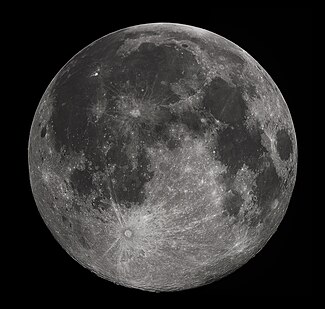The Moon is the only natural satellite of Earth and the fifth largest moon in the Solar System. Owing to its synchronous rotation around Earth, the Moon always shows essentially the same face: its near side, which is marked by dark volcanic maria, as well as the bright ancient crustal highlands and the prominent impact craters. However, variations in the Moon's orbital speed due to its orbital eccentricity cause a libration of several degrees of longitude; the alignment of the Moon's orbital plane causes a similar libration in latitude. The Moon was first reached in September 1959 by the Soviet Union's unmanned Luna 2, followed by the first successful soft landing by Luna 9 in 1966. The United States Apollo program achieved the only manned lunar missions to date, including Apollo 8 in 1968, the first manned orbital mission, as well as Apollo 11, the first of six manned landings between 1969 and 1972.
This picture shows the near side of the Moon close to its greatest northern ecliptic latitude, so the southern craters are especially prominent. Tranquility Base, Apollo 11's landing site, is located near the mid-right in the photograph.Photograph credit: Gregory H. Revera
| This picture of the day has been featured on Portal:Solar System. |
